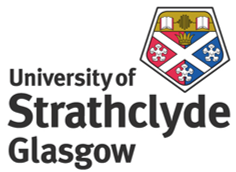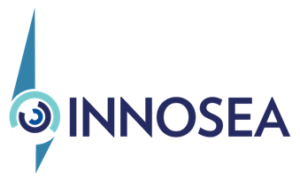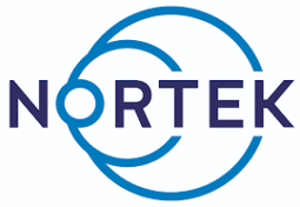ELEMENT is a cross-sector collaboration bringing commercial tidal energy developers together with leading academics and enterprises working in the fields of artificial intelligence, renewable energy policy, marine engineering, environmental protection and socio-economic modelling.
ELEMENT est un projet collaboratif réunissant des développeurs commerciaux d’énergie hydrolienne, des universités et des entreprises travaillant dans les domaines de l’intelligence artificielle, de la politique des énergies renouvelables, de l’ingénierie marine, de la protection de l’environnement et de la modélisation socio-économique.
Nova Innovation
 Leading the consortium is Nova Innovation, a tidal energy technology developer headquartered in Edinburgh (Scotland) which made history in 2016 with the installation of the world’s first grid-connected tidal array–The Shetland Tidal Array (STA). Two years later, they integrated Tesla battery technology with the Array to deliver the world’s first baseload tidal power station, which is fully operational and delivering power to local homes and businesses in Shetland.
Leading the consortium is Nova Innovation, a tidal energy technology developer headquartered in Edinburgh (Scotland) which made history in 2016 with the installation of the world’s first grid-connected tidal array–The Shetland Tidal Array (STA). Two years later, they integrated Tesla battery technology with the Array to deliver the world’s first baseload tidal power station, which is fully operational and delivering power to local homes and businesses in Shetland.
Nova’s M100 and RE50 turbines are the test devices for the ELEMENT system and will show-case design and performance gains during the project. Nova is responsible for managing the project (Work Package 1), designing the ELEMENT control system (WP 5), building the prototype (WP 7), as well as leading on tow testing and offshore testing (WPs 9 and 10).
Nova Innovation
À la tête du consortium se trouve Nova Innovation, un développeur d’hydroliennes dont le siège est à Édimbourg (Écosse) qui s’est distingué dans le domaine en 2016 avec l’installation de la première ferme hydrolienne marine au monde aux Shetland. Deux ans plus tard, des batteries Tesla ont été intégrées à la ferme, ce qui a permis d’injecter de manière constante de l’électricité dans le réseau. Cette ferme est pleinement opérationnelle et alimente en électricité les foyers et les entreprises locales des Shetland.
Au cours du projet, le système de contrôle ELEMENT va être testé sur les hydroliennes M100 et RE50 de Nova Innovation en vue de valider les gains de conception et de performance. Nova Innovation est responsable de la gestion du projet, de la conception du système de contrôle ELEMENT, de la construction du prototype, ainsi que de la direction des essais de remorquage et des essais offshores.
The University of Strathclyde
 The University of Strathclyde,, based in Glasgow, Scotland, is leading the development of the behavioural modelling technology at the heart of ELEMENT. The team comprises cutting-edge researchers working in the fields of electrical engineering, naval architecture and marine engineering departments: Dr Alasdair McDonald, Dr Hong Yue and Dr Gregory Payne.
The University of Strathclyde,, based in Glasgow, Scotland, is leading the development of the behavioural modelling technology at the heart of ELEMENT. The team comprises cutting-edge researchers working in the fields of electrical engineering, naval architecture and marine engineering departments: Dr Alasdair McDonald, Dr Hong Yue and Dr Gregory Payne.
The team leads on disseminating findings to the academic community (WP 2) and developing the advanced behavioural model for ELEMENT (WP 6), as well as providing insights from control system modelling work to the system design and advising on test analysis results.
L’Université de Strathclyde
L’Université de Strathclyde, basée à Glasgow (Écosse), dirige le développement de la technologie de modélisation du comportement qui est au cœur d’ELEMENT. L’équipe comprend des chercheurs de pointe travaillant dans les domaines du génie électrique, de l’architecture navale et du génie maritime : Dr Alasdair McDonald, Dr Hong Yue et Dr Gregory Payne.
L’équipe dirige la diffusion des résultats auprès de la communauté universitaire et le développement du modèle comportemental avancé pour ELEMENT., Elle fournit également des informations liées au travail de modélisation et de conception du système de contrôle, ainsi que des conseils sur les résultats de l’analyse des tests.
IDETA
 IDETA is a regional development agency in Wallonia, Belgium, which invests in and supports clean energy projects and infrastructure development. The team, led by Olivier Bontems, will conduct the socio-economic impact reporting and analysis for the project (WP 12), as well as advising on commercial market and business strategy.
IDETA is a regional development agency in Wallonia, Belgium, which invests in and supports clean energy projects and infrastructure development. The team, led by Olivier Bontems, will conduct the socio-economic impact reporting and analysis for the project (WP 12), as well as advising on commercial market and business strategy.
IDETA
IDETA est une agence de développement territorial en Wallonie (Belgique) qui investit et soutient des projets d’énergies renouvelables et de développement d’infrastructures durables. L’équipe, dirigée par Olivier Bontems, réalisera l’analyse de l’impact socio-économique du projet, et prodiguera des conseils en matière de marché et de stratégie commerciale.
Offshore Renewable Energy (ORE) Catapult
 The Offshore Renewable Energy (ORE) Catapult was established in 2013 by the UK Government and is part of a network of Catapults set up by Innovate UK in high growth industries. It is the UK’s leading innovation centre for offshore renewable energy. Independent and trusted, with a unique combination of world-leading test and demonstration facilities and engineering and research expertise, ORE Catapult convenes the sector and delivers applied research, accelerating technology development, reducing risk and cost and enhancing UK-wide economic growth.
The Offshore Renewable Energy (ORE) Catapult was established in 2013 by the UK Government and is part of a network of Catapults set up by Innovate UK in high growth industries. It is the UK’s leading innovation centre for offshore renewable energy. Independent and trusted, with a unique combination of world-leading test and demonstration facilities and engineering and research expertise, ORE Catapult convenes the sector and delivers applied research, accelerating technology development, reducing risk and cost and enhancing UK-wide economic growth.
ORE Catapult leads on communication and dissemination of results (WP 2) and onshore testing of ELEMENT at the National Renewable Energy Centre (WP 8), as well as providing engineering expertise on the model design, assisting in estuary testing and advising on financial and market analysis.
ORE Catapult
La société Offshore Renewable Energy (ORE) Catapult a été créée en 2013 par le gouvernement britannique et fait partie du réseau Catapult mis en place par Innovate UK dans les secteurs à forte croissance. C’est le principal centre d’innovation du Royaume-Uni pour les énergies marines renouvelables. Indépendante et reconnue, ORE Catapult propose une combinaison unique d’installations de tests de sites de démonstration, et d’expertise en ingénierie et en recherche. Positionnée au centre du secteur, elle conduit une recherche appliquée permettant d’accélérer le développement technologique, de réduire les risques et les coûts et d’améliorer la croissance économique à l’échelle du Royaume-Uni.
ORE Catapult dirige la communication et la diffusion des résultats, et les tests d’ELEMENT à terre au Centre national des énergies renouvelables. Elle fournit aussi une expertise en ingénierie sur la conception du modèle, une assistance aux tests en estuaire et des conseils concernant l’analyse financière et commerciale.
France Energies Marines (FEM)
 Established in 2012, France Energies Marines (FEM) is the National Institute for Energy Transition dedicated to supporting the global offshore renewable energy sector. Its multi-disciplinary team work across four thematic areas: site characterisation, technology design, environmental integration and wind farm operational optimisation.
Established in 2012, France Energies Marines (FEM) is the National Institute for Energy Transition dedicated to supporting the global offshore renewable energy sector. Its multi-disciplinary team work across four thematic areas: site characterisation, technology design, environmental integration and wind farm operational optimisation.
FEM leads on environmental impact assessment (WP 4) and communication and dissemination activities in France.
France Énergies Marines (FEM)
Créé en 2012, France Énergies Marines est l’Institut français pour la Transition Énergétique dédié à l’accompagnement de la filière des énergies marines renouvelables. Son équipe pluridisciplinaire travaille sur quatre axes thématiques : caractérisation de sites, dimensionnement et suivi des systèmes, intégration environnementale et optimisation des parcs offshores.
France Énergies Marines dirige l’évaluation de l’impact environnemental et les activités de communication et de diffusion en France.
Wood
 Wood‘s clean energy business specialises in renewable energy and grid integration, providing engineering and technical advisory services that support the delivery of projects around the world. Wood’s market-leading services and technologies provide engineering know-how to onshore and offshore wind, solar, wave and tidal and hydro projects.
Wood‘s clean energy business specialises in renewable energy and grid integration, providing engineering and technical advisory services that support the delivery of projects around the world. Wood’s market-leading services and technologies provide engineering know-how to onshore and offshore wind, solar, wave and tidal and hydro projects.
Wood leads WP3, setting the commercialisation strategy for ELEMENT and providing independent verification of the system, as well as advising on testing methodology.
Wood
Sur son volet énergies propres, Wood est spécialisé dans les énergies renouvelables et l’intégration des réseaux, fournissant des services d’ingénierie et de conseil technique qui soutiennent la réalisation de projets dans le monde entier. Les services et technologies de pointe de Wood fournissent un savoir-faire aux projets éoliens, solaires, houlomoteurs et hydroliens terrestres et marins.
Wood définit la stratégie de commercialisation d’ELEMENT et réalise une vérification indépendante du système. Il apporte aussi des conseils sur la méthodologie de tests.
INNOSEA
 Headquartered in Nantes, France, INNOSEA provides professional engineering consultancy and services to the offshore renewable energy sector. INNOSEA is a proud subsidiary of the LOC Group, the premier independent maritime and engineering consultancy firm.
Headquartered in Nantes, France, INNOSEA provides professional engineering consultancy and services to the offshore renewable energy sector. INNOSEA is a proud subsidiary of the LOC Group, the premier independent maritime and engineering consultancy firm.
INNOSEA will contribute to the basic model design and implementation, support testing with procurement and best practice and advise on result analysis.
Innosea
Basé à Nantes, en France, INNOSEA fournit des conseils et des services d’ingénierie professionnels pour le secteur des énergies marines renouvelables. INNOSEA est une filiale du groupe ABL, le premier cabinet de conseil indépendant sur les aspects énergétiques et maritimes.
INNOSEA contribuera à la conception et à la mise en œuvre du modèle de base. Il apportera aussi son soutien concernant les processus d’approvisionnement et les bonnes pratiques en matière de tests, ainsi que sur l’analyse des résultats.
DNV GL
 DNV GL is the leading certification body in wind, wave and tidal energy. Heavily based on research and innovation activities around the world, the company consolidates its knowledge into state-of-the-art standard and guidelines supporting the development of the industry.
DNV GL is the leading certification body in wind, wave and tidal energy. Heavily based on research and innovation activities around the world, the company consolidates its knowledge into state-of-the-art standard and guidelines supporting the development of the industry.
The organisation will advise on certification and standards, provide insights into model design, and assist with interpretation of findings.
DNV GL
DNV GL est le principal organisme de certification dans le secteur des énergies éolienne, houlomotrice et hydrolienne. Fortement basé sur des activités de recherche et d’innovation dans le monde entier, il transpose ses connaissances consolidées dans des normes et directives soutenant le développement de l’industrie.
DNV GL fournira des conseils concernant la certification et les normes, ainsi que des informations sur la conception du modèle. Il aidera aussi à l’interprétation des résultats.
Chantier Bretagne-Sud
 Chantier Bretagne-Sud (CBS) will host and manage the estuary testing stage of the ELEMENT project at its shipyard and marine manufacturing facilities in Brittany, France. The CBS team will also build the testing infrastructure, assist with design of test procedures and advise on materials, procurement and site practicalities.
Chantier Bretagne-Sud (CBS) will host and manage the estuary testing stage of the ELEMENT project at its shipyard and marine manufacturing facilities in Brittany, France. The CBS team will also build the testing infrastructure, assist with design of test procedures and advise on materials, procurement and site practicalities.
Chantier Bretagne Sud
Le Chantier Bretagne Sud hébergera et gérera la phase d’essais en estuaire du projet ELEMENT dans son chantier naval situé en Bretagne (France). Son équipe construira également l’infrastructure de tests et aidera à la conception des procédures de tests. Il apportera des conseils sur les matériaux, les processus d’approvisionnement et les aspects pratiques lié au site estuarien.
Nortek
 Nortek designs, develops and produces scientific instruments for acoustic measurement of water in motion from their base in the city of Rud, Norway. They will develop the sensory technologies for the ELEMENT control system, as well as supplying the acoustic measurement equipment (ADCP), assisting with system integration and data analysis.
Nortek designs, develops and produces scientific instruments for acoustic measurement of water in motion from their base in the city of Rud, Norway. They will develop the sensory technologies for the ELEMENT control system, as well as supplying the acoustic measurement equipment (ADCP), assisting with system integration and data analysis.
Nortek
Basé à Rud en Norvège, Nortek conçoit, développe et produit des instruments scientifiques pour la mesure acoustique des mouvements d’eau. La société développera les technologies de capteurs pour le système de contrôle ELEMENT, et fournira les équipements de mesure acoustique de type profileurs de courant (ADCP). Elle aidera aussi à l’intégration du système et à l’analyse des données.
ABB
 ABB is a pioneering technology leader with a comprehensive offering for digital industries. With a history of innovation spanning more than 130 years, ABB is today a leader in digital industries with four customer-focused, globally leading businesses: Electrification, Industrial Automation, Motion, and Robotics & Discrete Automation, supported by its common ABB Ability™ digital platform.
ABB is a pioneering technology leader with a comprehensive offering for digital industries. With a history of innovation spanning more than 130 years, ABB is today a leader in digital industries with four customer-focused, globally leading businesses: Electrification, Industrial Automation, Motion, and Robotics & Discrete Automation, supported by its common ABB Ability™ digital platform.
ABB is supplying the power electronics equipment to ELEMENT and will provide advice on system design.
ABB
ABB est un pionnier et leader en matière de technologies avec une offre complète pour l’industries du numérique. Innovant depuis plus de 130 ans, ce groupe au rayonnement mondial développe quatre activités orientées clients : l’électrification, l’automatisation industrielle, le mouvement, ainsi que la robotique et l’automatisation discrète, soutenues par sa solution numérique commune ABB Ability™.
ABB fournira l’équipement d’électronique de puissance à ELEMENT et apportera des conseils sur la conception du système.


